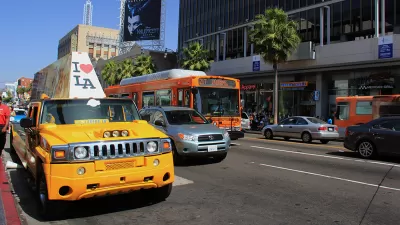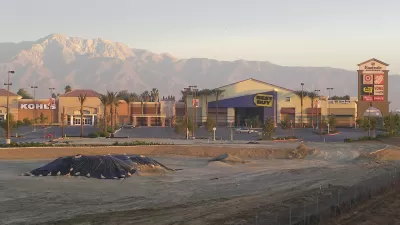According to new figures from California's Annual Planning Survey, the state's environmental law is low on the list of barriers to infill development, writes Ethan Elkind.
California's landmark Environmental Quality Act (CEQA) has been under threat of late from a broad coalition of politicians, labor leaders, and developers, who see the law as an easily abused obstacle to economic development. However, as Elkind points out, according to the results of the Governor's Office of Planning and Research's 2012 annual survey [PDF] of California's local governments, those looking to blame CEQA for preventing infill development should look elsewhere.
"Of the 423 cities (88% of all cities) and 49 counties (84% of all
counties) responding to the survey, less than 5% cited CEQA as the
primary barrier to infill development. Instead, the big 'winners' were
infrastructure constraints, lot issues, lack of funding, community
opposition, and the economy, among others. CEQA was way down on the list."
"So why do infill developers make such a big deal about CEQA?" asks Elkind. "My [Elkind's] theory
is that individual developers will be focused solely on their own
projects, and if CEQA is a threat to their investment and risk-taking,
they will understandably become CEQA haters. But perhaps this
project-based focus distorts the view of the larger forces that stifle
infill business opportunities throughout the state, such as in the
suburb with the major rail line that won't zone for more downtown
development or the rundown neighborhood near jobs and services that
needs new infrastructure."
"Ending CEQA tomorrow won't magically lift
these barriers and create new infill opportunities, and it won't
convince local communities to support new downtown development."
FULL STORY: Why Developers Shouldn’t Blame Environmental Review for the Lack of Infill

Planetizen Federal Action Tracker
A weekly monitor of how Trump’s orders and actions are impacting planners and planning in America.

Map: Where Senate Republicans Want to Sell Your Public Lands
For public land advocates, the Senate Republicans’ proposal to sell millions of acres of public land in the West is “the biggest fight of their careers.”

Restaurant Patios Were a Pandemic Win — Why Were They so Hard to Keep?
Social distancing requirements and changes in travel patterns prompted cities to pilot new uses for street and sidewalk space. Then it got complicated.

Platform Pilsner: Vancouver Transit Agency Releases... a Beer?
TransLink will receive a portion of every sale of the four-pack.

Toronto Weighs Cheaper Transit, Parking Hikes for Major Events
Special event rates would take effect during large festivals, sports games and concerts to ‘discourage driving, manage congestion and free up space for transit.”

Berlin to Consider Car-Free Zone Larger Than Manhattan
The area bound by the 22-mile Ringbahn would still allow 12 uses of a private automobile per year per person, and several other exemptions.
Urban Design for Planners 1: Software Tools
This six-course series explores essential urban design concepts using open source software and equips planners with the tools they need to participate fully in the urban design process.
Planning for Universal Design
Learn the tools for implementing Universal Design in planning regulations.
Heyer Gruel & Associates PA
JM Goldson LLC
Custer County Colorado
City of Camden Redevelopment Agency
City of Astoria
Transportation Research & Education Center (TREC) at Portland State University
Camden Redevelopment Agency
City of Claremont
Municipality of Princeton (NJ)





























